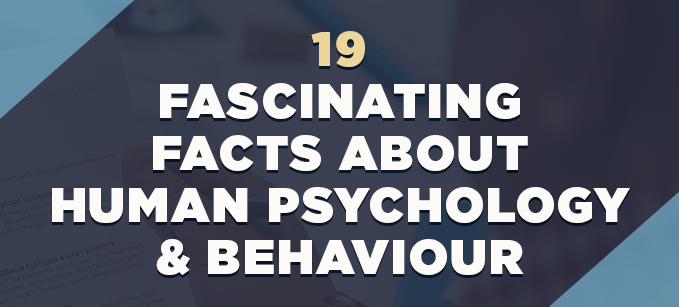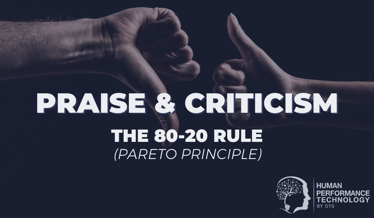19 Fascinating Facts About Human Psychology & Behaviour
-3 Minute Read

- Publicly announcing your goals makes you less likely to succeed. In a TED Talk with more than 3 million views, Derek Silvers "presents research stretching as far back as the 1920s to show why people who talk about their ambitions may be less likely to achieve them." Source.
- Integrity is more situational than most people think. People exhibit less self-control as they become more tired, and are more likely to act "immoral" as the day wears on. Source.
- There is a type of cognitive bias called the Dunning-Kruger Effect in which smart people underestimate themselves and ignorant people think they’re brilliant. It was named after two social psychologists, Justin Kruger and David Dunning, who wrote a paper called "Unskilled and Unaware of it" about a US bank robber in 1995 who smeared lemon juice over his face because he thought he would become invisible to the security cameras at the bank. Source.
- Stories trump statistics: In a study conducted by Dan and Chip Heath (authors of Made to Stick), they found the typical student uses 2.5 statistics and only 1/10 tells a story. However, when students are asked to recall the speeches, 63% remember the stories and only 5% remember any individual statistic. Source.
- Images trump words: According to one study, participants only remember about 10% of information presented orally when they are tested 72 hours after instruction. However, that number jumps by about 65% when an image is added to the learning process. Source.
- As humans and other animals approach reaching a goal, they accelerate their efforts the closer they get to the goal. For example, rats run faster as they near the end of a maze, and humans will purchase more coffee the closer they get to receiving a free coffee on a loyalty voucher. This is known as the Goal Gradient Effect. Source.
- Dr. John Gottman has devised a famous “magic ratio,” which allows him to predict, with about 90% accuracy, whether a newlywed couple will remain married or be divorced 4-6 years later. In essence, the magic ratio is 5:1 positive to negative interactions between a couple. Source.
- If someone insults the way you look, why is the experience so difficult to forget? Why do people tend to focus on the one bad thing when a thousand other things are going right? It’s called Negativity Bias (humans have a greater recall of unpleasant memories compared with positive ones). Source.
- People have a natural tendency to attribute causes of other people’s behaviour to their character instead of situational factors. For example, when someone cuts you off in traffic, you are likely to think it is because the person is rude or stupid instead of thinking they might be rushing to the hospital, having a bad day, are late for a meeting, etc. Psychologists call this Fundamental Attribution Error. Source.
- Researchers have identified 12 tactics of manipulation that couples use in relationships ranging from “charm” to “hardball.” Source.
- Surveys of teachers have found that upwards of 95% believe that individuals learn better if students receive information in their preferred learning style (e.g., auditory, visual, kinesthetic). In reality, there is no credible evidence to support this idea, having been reviewed by numerous sets of independent researchers, making the learning styles “meshing hypothesis” the most widely believed yet thoroughly debunked neuromyth. Source.
- The 55-38-7 rule of communication is a myth. (i.e. the idea that what people communicate is 55% body language, 38% tone, 7% word content.) It is a widely quoted statistic in communication and presentations skills training based on the work of Albert Mehrabian in the 1960s, which was taken out of context. Some now refer to it as the Mehrabian Myth. Source.
- Despite being one of the most commonly taught models in business and education, Maslow’s famous hierarchy of needs was never based on any empirical research. It was developed based on Maslow’s personal life experience and observations of others. Although extremely difficult to test, there is no research to support Maslow’s Need Hierarchy Theory (i.e. the idea that there are five basic needs that emerge in the linear succession, one after the next, or that certain needs are proponent over others). Source.
- Several studies have found that open plan offices make employees less happy and less productive. Source.
- In her famous TEDTalk with over 8 million views, health psychologist Kelly McGonigal discusses the results of a major study that suggests stress may only be harmful if you believe that stress itself is bad for you. Source.
- Someone might believe that "honesty is the best policy" only to find themselves making a false statement on their resume, which creates a feeling of mental discomfort. This discomfort is called Cognitive Dissonance (thought disharmony caused when our beliefs or behaviours are contradicted). The individual may reduce this feeling with denial or self-justification by saying that "everyone exaggerates on their resume so what's the big deal?" Cognitive dissonance is one of the most prolifically documented theories in social psychology, developed in the 1960s by Leon Festinger who infiltrated a cult that had predicted the destruction of the Earth at a specific time. The research tried to explain how it was possible that members of the cult increased their fanaticism after being definitively proven wrong. Source.
- Do opposites attract? The existing research overwhelmingly supports the idea that similarity leads to attraction and better quality relationships. What's more, having similar values is even more predictive of a satisfying romantic relationship than having similar personality traits. Source.
- The idea that money can buy happiness has some merit, but only up to a certain point. According to Deakin University that point is around $100,000 per year in Australia and according to a famous study by two Princeton University researchers that point is $75,000 in America, beyond which more money doesn't make a person happier, though it can help people view their lives as successful or better. Source1. Source2.
- Social pressure is incredibly powerful. The famous Asch conformity experiments by Solomon Asch in the 1950s included one that demonstrated people would turn and face the wall in an elevator if several others were facing in that direction. Source.

Theo Winter
Client Services Manager, Writer & Researcher. Theo is one of the youngest professionals in the world to earn an accreditation in TTI Success Insight's suite of psychometric assessments. For more than a decade, he worked with hundreds of HR, L&D and OD professionals and consultants to improve engagement, performance and emotional intelligence of leaders and their teams. He authored the book "40 Must-Know Business Models for People Leaders."

/Disc%20profile_%20i%20is%20for%20influence.png?width=374&name=Disc%20profile_%20i%20is%20for%20influence.png)

We Would Like to Hear From You (0 Comments)